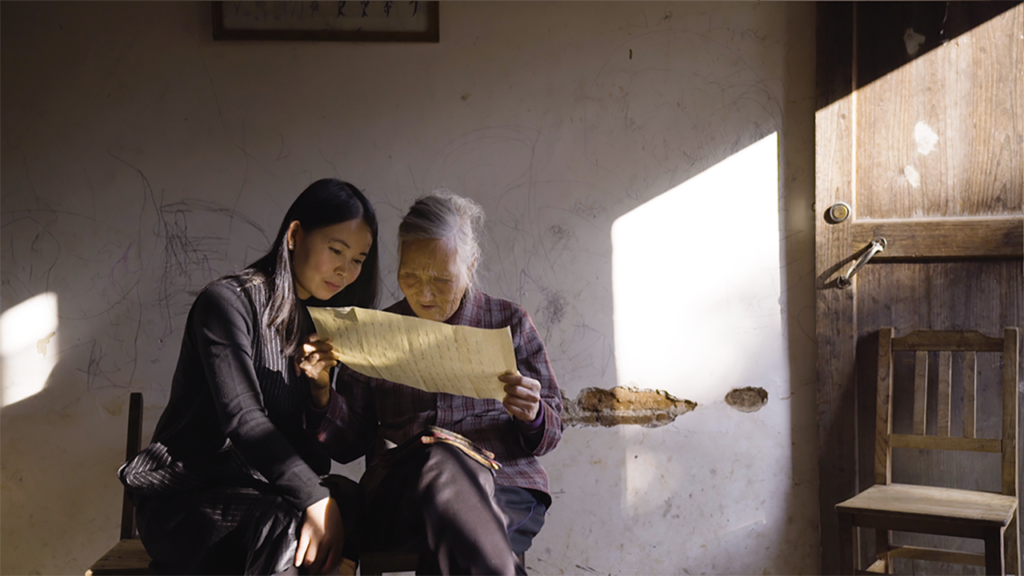“A man dreams to conquer the world / Does a woman dream any less?” a Nüshu poem asks.
Centuries ago, in a rural pocket of China called Jiangyong County, at a time when women and girls were held captive in their homes – and by a culture entrenched in misogyny – a language of rebellion was born. Nüshu (女書), which translates literally to “women’s script,” is the world’s only language invented and used exclusively by women. The syllabic script of delicate, graceful strokes derived from Chinese characters that was inherited from grandmothers to mothers to daughters forged a secret sisterhood that mutually validated each other’s daily grievances and empowered self-expression in a society that violently silenced women.
Nearly 200 years since its invention, Violet Du Feng’s “Hidden Letters” examines the current state and the future of Nüshu in contemporary China. Feng’s doc, which debuted at this year’s Tribeca Film Fest, follows Hu Xin and Wu Simu, two women wrestling against societal pressures of marriage and motherhood while also protecting Nüshu from extinction – or worse, exploitation by men. A calligrapher and docent at the Museum of Nüshu, Hu is one of seven government-certified practitioners and the youngest inheritor of the script. She taught Nüshu to aspiring singer Wu, whose unadulterated love for the language has compelled her to protect it from capitalistic greed. Co-directed with previous collaborator Zhao Qing (“Please Remember Me”), Feng’s film honors the courage and mettle of the Nüshu sisterhood, a support system whose longevity speaks for itself.
After all, “Nüshu is far more than just a written language — it embodies the power of sisterhood and safe spaces to self-actualize identity,” Feng explains in the press notes for the film. “This practice, which validated their talent, intelligence, and existence, was an act that literally saved lives in an era when women’s feet were bound for beauty, movement was confined to the chamber, and their intellect was denied the privilege of literacy. In a world where there was almost no existence of female literature, most women here had their own written biographical ballads.”
We meet the two Nüshu stewards at watershed moments in the millenials’ lives: Hu recently severed ties with an abusive ex-husband and is coping with the stigma of divorce, while Wu hesitates to marry a man who discourages her autonomy and passion for Nüshu. For both women, Nüshu is a portal to their women ancestors. Women whose resilience in the face of suffering and abuse is immortalized in poetry and song, as if to reassure progeny that they, too, can surmount their hardships.
As she prepares a women’s art exhibit, Wu, who describes Nüshu as a “lighthouse” that “shines the way ahead,” is inspired to write a letter in response to a Nüshu artifact. “She’s gone and won’t receive it of course,” she acknowledges about the poem’s author. “But I want to travel in time and start a dialogue. Maybe another woman in the future will want to talk to me too.”
Wu’s mother supports her artistic pursuit of Nüshu and eventual decision to leave her fiancé. “Women are half of the world. We have to feel entitled to our own power,” she says.
“Hidden Letters” also tells the story of He Yanxin, an elderly woman who learned Nüshu from her grandmother and taught it to Hu. As the language becomes more commercialized as a novelty and tourist attraction, He laments the enemy invasion of what used to be a safe harbor for women. We see He refusing to demonstrate a new Nüshu phone – unsurprisingly invented by a man – at the device’s unveiling. “Our letters to the sisters were all very private, to share our sufferings secretly. Whatever it is now has nothing to do with the Nüshu we had,” she emphasizes.
Feng sees He and Hu’s relationship as a microcosm of the centuries-long Nüshu sisterhood. As Hu’s Nüshu mentor and, in many ways, surrogate grandmother, He emphasizes to the Nüshu advocate she is “worthy of the same care and respect that she gives to Nüshu, and the destinies of herself and Nüshu are intertwined, if not the same,” the director revealed in press notes. “Their relationship epitomizes Nüshu in that so long as women confide, listen, and bond to one another, the power of Nüshu will persevere. And that’s what we continue to need despite our differences in culture, religion, geopolitics or age.”
“Hidden Letters” hits theaters December 9. It won the Grand Prize for Documentary Feature at the 2022 Heartland International Film Festival.







